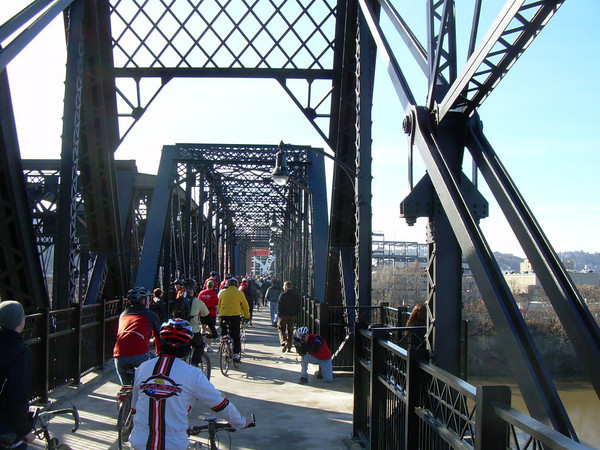Now that the dust has settled, we have a few more notes on the Senate transportation bill that passed the EPW committee yesterday. Bike and pedestrian advocates are understandably shaken at seeing some major changes to the primary programs that fund their work. But here are some reasons to take heart:

- Getting Transportation Enhancements out of the Surface Transportation Program is not necessarily a bad thing. You know how Republicans love to say that Enhancements get an unfair “set-aside” of 10 percent of the surface transportation program? They just lost that talking point. Still, STP is now part of the new, broader Transportation Mobility Program, and bike/ped projects will still be eligible for funding under TMP, as well as under the dedicated TE pot.
- We’ve written before that eligibility for funding isn’t the same as having your own pot of dedicated money, and that’s certainly true. After all, states that “get it” will invest in smart active transportation projects, while state DOTs still stuck in the highway era won’t spend a dime on cycling and walking if they’re not forced to. But the fact is, they were finding ways around it anyway. Dedicated funds for bike/ped projects often became “rescission fodder” when it came time for states to give some dough back to Washington. States like Inhofe’s Oklahoma knew rescission time was coming and they held on to that money just so they could give it away.
- Give credit to Sen. Barbara Boxer and her staff, as well as other Democrats on the committee who fought hard for this. It’s kind of hard to believe that in a $109 billion bill, something as small as bike/ped funding nearly broke down negotiations, but it did, several times. A deal of some kind was necessary in order to get Republicans on the bill, and to placate people like Tom Coburn, who would stop at nothing to get rid of dedicated TE funding. Democrats fought hard to keep Republicans at the table and hold on to active transportation money in the bill. It could have been a lot worse: Republicans wanted TE out of the bill entirely and had to settle for “flexibility.”
- One of the road-related uses that looked like it would be allowed under TE was removed yesterday – that money will not be available to build HOV and HOT lanes.
- There’s still hope to make the bill better. Democrat Ben Cardin’s amendment [PDF] to leave transportation enhancement spending in the hands of local areas instead of states would have a huge impact, since cities and towns are much more likely to see the need for bike and ped infrastructure than states are.
- And remember, dedicated funding for TE wasn’t exactly eliminated. (Dedicated funding for Safe Routes to School and the Recreational Trails Program was, however; though they can still get funded as eligible programs under CMAQ, the Congestion Mitigation and Air Quality improvement program.) TE still has a dedicated amount close to what it had before – although TE is now “under” CMAQ in the bill, the money isn’t commingled.
- And if it makes you feel any better, when the committee collapsed 90 programs down to 30, lots of pots of funding were eliminated. So, don’t feel singled out.
- In the end, getting a bill on its way to authorization is better than the alternatives. We’re now on the eighth extension of SAFETEA-LU, and everyone agrees it needs to be the last one. Without finding some more money to maintain current funding levels, as the Senate Finance Committee is currently doing, current transportation spending will bankrupt the Highway Trust Fund and make the 30 percent cuts in the original House bill nearly unavoidable. Meanwhile, even the House Republicans who proposed the 30 percent cut have distanced themselves from that position – though their current proposal to fill the gap with oil drilling revenue won’t do much to bring Democrats to their side.
- It’s good the Senate is ahead of the House. For a while it seemed Boxer was waiting for the House to go first, and then it seemed she was waiting for the $12 billion to be resolved before coming forward with the bill – but the horse is out of the gate now and it’s good that the Senate bill will set the tone for the conversation from here on.
While the House works to get a bill out soon – Boehner promised one “in the coming weeks” about a week ago – Sen. Max Baucus and his Finance Committee will be working to find that elusive $12 billion. Politico is reporting that the Banking Committee could mark up the transit portion the week after Thanksgiving, and Commerce will move the rail section before year's end.





